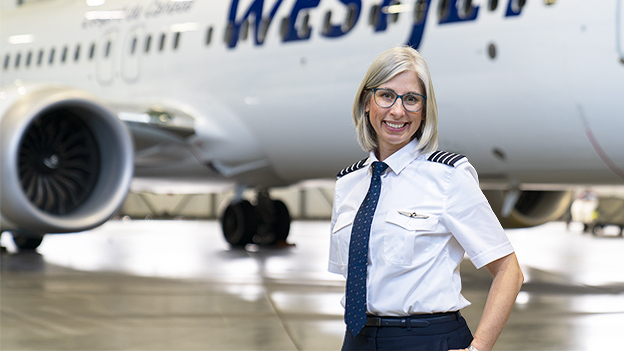Suzanne Foraie, WestJet’s first woman Chief Pilot

It was 29 years ago, Suzanne Foraie learned to fly, earning her glider pilot license with the Royal Canadian Air Cadet program in 1993, before obtaining her private pilot license by the age of 17.
Today, Suzanne, WestJet, Chief Pilot, Line Operations, is the first woman to hold the instrumental role of Chief Pilot at WestJet and is committed to using her platform to increase representation of women from diverse backgrounds on the Flight Operations team.
We sat down with Suzanne to ask her a few questions about how her love for the skies came to be, her goals for the future and why she would encourage women to pursue a career in aviation.
What inspired you to be a pilot?
I've always wanted to be a pilot or so it seems. When I was three years old, my dad took me on my first airplane ride to Disneyland and I was so excited to be on a plane. That day my dad recalls me telling him that one day I was going to fly a plane – and so I did.
When I was 12, my dad encouraged me to join the Air Cadet program just as he had as a teen. As soon as I did, I was immediately hooked and knew that aviation was my future and began making a road map to ensure my dreams would become my reality.
What has been a career highlight for you?
In addition to accepting this role, in 2018 I was able to take my husband and daughter to work with me, as I operated the Boeing 737-MAX from Calgary to Maui. The opportunity to bring my daughter along and show her my passion, just as my dad did with me as a child, was incredibly special.
What does it mean to be the first woman in this role at WestJet?
This is a definite milestone moment for me. When I first joined WestJet in 2003, I recall a fellow woman first officer telling me I was number nine. At first, I didn't understand what she meant until she emphasized “You're the ninth female pilot at WestJet."
I've never thought of myself as a woman pilot, but rather a pilot, a first officer, a captain, a training captain, until now. To be hired into this role as the first female chief pilot at WestJet demonstrates that women can do and have it all, the same as our male colleagues. We can work hard, have a family, enjoy time for personal pursuits and still be recognized for our skills, efforts and the value we contribute to the organization.
As a woman in this role what are your goals and objectives?
As we focus our recruiting efforts across the WestJet Group, I hope to increase the awareness that women can have an integral role on the Flight Operations team. Women pilots at the airline level are underrepresented among our peers and it isn't due to a lack of interest in aviation. For decades, women have been flying the skies as cabin crew balancing their family life with time away, yet few pursue the skills required to become a pilot.
It's time that our daughters, granddaughters, nieces, sisters, and schoolmates distinguish aviation as a world filled with opportunities where they are welcomed and encouraged to thrive in. I look forward to the years to come where we will move towards an increased percentage of women bringing their skills to our pilot ranks.
At WestJet only 5.6 per cent of our pilots are women, is it a close community?
Absolutely, it's both a close and small community, which means that the connections are meaningful. It's impossible to go flying as an all-women crew without someone commenting and congratulating the crew. It's funny how much this is noticed, even in 2022. Collectively, we come from varied and diverse backgrounds, yet we all share the experience of pursuing a non-traditional career, which sets the stage for strong connections.
Why would you encourage women to pursue a career in aviation?
Aviation is the ultimate adventure - it’s a unique opportunity to get to see the world and get paid to do it! Career advancement opportunities are abundant and with bidding flexibilities, women can have a career as an airline pilot and have a family, with the ability to create a schedule that works best for their individual lifestyle.
Additionally, becoming a pilot is far more attainable and accessible than ever before. When I graduated from aviation college, it was expected that a pilot would need to spend several years working ancillary roles for an aviation company before being promoted to fly. Today, pilots have far greater choice in mapping out their aviation careers and can move into a flying role far quicker than ever before with endless opportunities for advancement.
There is a world of opportunities awaiting in aviation, quite literally, and it’s the responsibility of those of us in the industry, particularly leaders, to keep the positive momentum going towards achieving increased diversity and inclusion by driving awareness, answering questions and mentoring those who express interest.



